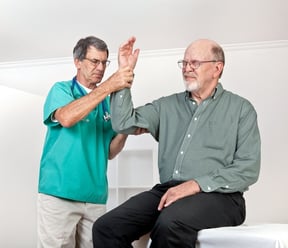 Joint replacement surgery, which replaces a damaged or diseased joint with an artificial joint, has helped millions of people reduce chronic pain and restore mobility and independence. Knees and hips are the joints most frequently replaced via these procedures, with over a million Americans having one of these joints replaced every year, according the National Institutes of Health. So why do so many people need joint replacement? In many cases, arthritis is the answer to that question, as the disease causes joint damage and deterioration that can lead to chronic pain and significant disability, severely impacting quality of life.
Joint replacement surgery, which replaces a damaged or diseased joint with an artificial joint, has helped millions of people reduce chronic pain and restore mobility and independence. Knees and hips are the joints most frequently replaced via these procedures, with over a million Americans having one of these joints replaced every year, according the National Institutes of Health. So why do so many people need joint replacement? In many cases, arthritis is the answer to that question, as the disease causes joint damage and deterioration that can lead to chronic pain and significant disability, severely impacting quality of life.
How Arthritis Can Lead to Joint Replacement Surgery
Arthritis is a term used to describe more than 100 forms of joint disease that can cause joint pain, inflammation, and damage. Of those many types of arthritis, there are two that most frequently cause the severe joint damage and deterioration that makes joint replacement surgery necessary: osteoarthritis and rheumatoid arthritis.
Osteoarthritis, also commonly referred to as "wear-and-tear arthritis" or "degenerative arthritis," is a leading cause of joint replacement procedures. In this form of arthritis, the cartilage that cushions the joints wears away gradually, eventually leaving bone ends that make up the joints unprotected, allowing them to grind against each other as the joint functions. This leads to pain, stiffness, and swelling in the joint, and in the advanced stages of the disease, the development of bone spurs within the joint and a progressive deterioration of joint function. During this late stage of osteoarthritis, non-surgical treatments like medications, weight loss, physical therapy, and use of assistive devices are often insufficient in terms of reducing painful and debilitating symptoms, resulting in a recommendation for joint replacement surgery.
Rheumatoid arthritis is an inflammatory form of arthritis that is caused by auto-immune activity in the body. It occurs when the body's immune system attacks the linings of joints, causing stiffness, pain, swelling, and heat in the joint. This auto-immune disorder is a progressive disease that slowly damages the joints, and in its advanced stages it can cause joint deformity and disability. It is generally treated with a combination of medications, physical therapy, and lifestyle changes, which can slow progression of the disease. However, in cases where severe joint damage has occurred, joint replacement surgery is often the most effective means of restoring mobility, relieving pain, and improving quality of life.
About Joint Replacement Surgery
While joint replacement, especially hip and knee replacement, are generally very successful in treating the symptoms of severe arthritis in most patients, it is important to note that these procedures are not a quick fix. These are major surgeries, and their typical benefits take months of recovery and rehabilitation therapy to be fully realized. However, for the vast majority of patients, according to the American Academy of Orthopaedic Surgeons, the end result is an improved quality of life that includes less pain, along with improved motion and strength that would not have been possible without joint replacement surgery.





